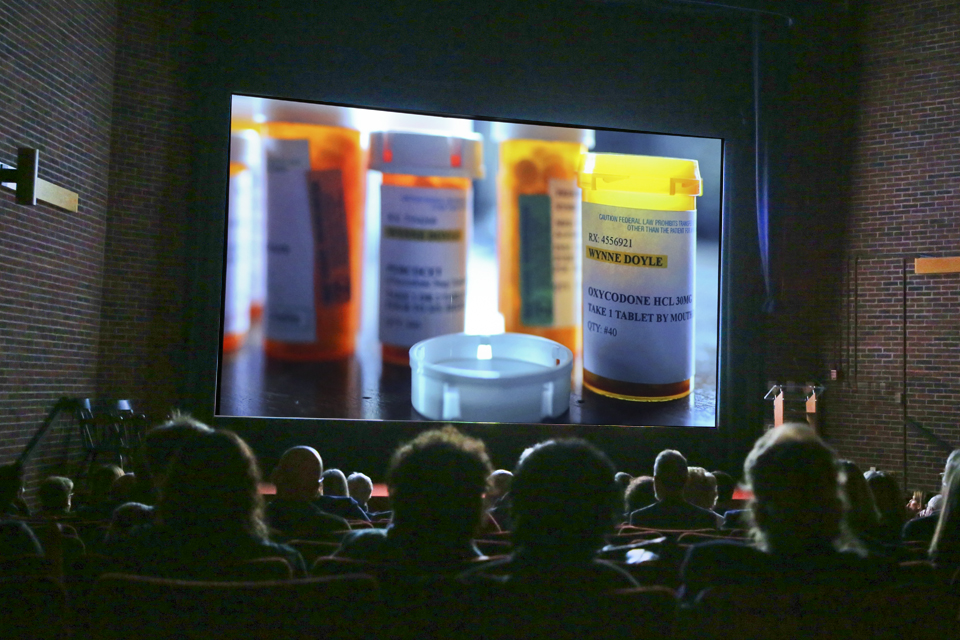Brandeis launches Opioid Policy Research Collaborative
Local politicians, NBC's Cynthia McFadden headline OPRC launch.
 Photos/Mike Lovett
Photos/Mike LovettDocumentary screening of “Warning: This Drug May Kill You” at the OPRC launch event.
Brandeis University has launched a research collaborative to connect policymakers, state and federal health officials, private organizations and the media with the latest, relevant policy research that is needed to address the opioid addiction epidemic.
The Opioid Policy Research Collaborative (OPRC), co-directed by Andrew Kolodny and Peter Kreiner, is housed in the Schneider Institutes for Health Policy at the Heller School for Social Policy and Management. The launch was celebrated in an event on the Brandeis campus that included a film screening, a panel discussion moderated by Cynthia McFadden of NBC News, and remarks from Congresswoman Katherine Clark.
At the event, Kolodny said government and public health officials are trying to align policies and laws with the realities of the epidemic, but often “they’re shooting in the dark. We don’t yet know the best way to solve these problems.”
“What are the right ways to try to prevent people from getting addicted? That’s what we want to study at the OPRC,” he said.
More than 100 people attended the launch celebration, which began with a screening of the HBO documentary, “Warning: This Drug May Kill You” at Wasserman Cinematheque. The documentary offers a shocking window into the lives of four opioid-addicted people and their immediate families.
In the panel moderated by McFadden after the screening, experts and the documentary’s creator discussed ongoing opioid policy and treatment needs.
“We are well aware this is not an easy film to watch,” said Perri Peltz, the film’s director and producer. “When I started making this movie two and half years ago, this story wasn’t out there. We felt we had to be shocking.”
Peltz credited fellow panelist and Kolodny with giving the film its focus on stories of addiction that stem from the legal use of painkillers as prescribed by physicians. While dependence on opioids can begin within days of taking them as directed, for years pharmaceutical companies and others blamed the problem on intentional misuse, Peltz said.
“Andrew is the one who made us understand what it is about,” she said.
The panel also included Massachusetts Secretary of Health and Human Services Marylou Sudders and Dr. Myechia Minter-Jordan, President and CEO of the Dimock Center. The film was introduced by Heller School Dean David Weil.
When McFadden asked Sudders for her legislative “wish list” to bring the opioid crisis to a halt, she unequivocally responded that she would ban OxyContin.
“I would also hold pharma accountable for finding non-addictive alternatives to pain meds,” Sudders said.
Minter-Jordan said that in many cases, people who seek medication-assisted treatment with drugs such as buprenorphine succeed and do very well.
“It is a chronic addiction and we do expect relapse,” she said, “But there are incredible success stories.”
Both Sudders and Minter-Jordan had some parting advice for the audience:
“If you do nothing else after this, go home, look in your medicine cabinet and dispose of your unused, unnecessary prescription drugs,” Sudders said.
“Take what you’ve learned tonight and talk to someone in your house about it,” Minter-Jordan said.
Clark, who has met with numerous families of people who died of opioid overdoses, praised the OPRC’s mission in remarks during a dinner in the Faculty Club.
“What you’re doing for this community out of this incredible rigorous academic environment at Brandeis...is going to make a difference for families in the future,” she said.
U.S Senator Edward Markey sent a video message viewed during the dinner.
“I pledge my support for your work,” Markey said in the video. “I believe the people here tonight can and will make a difference.”
Watch the full panel conversation:
Categories: General, Research, Science and Technology





